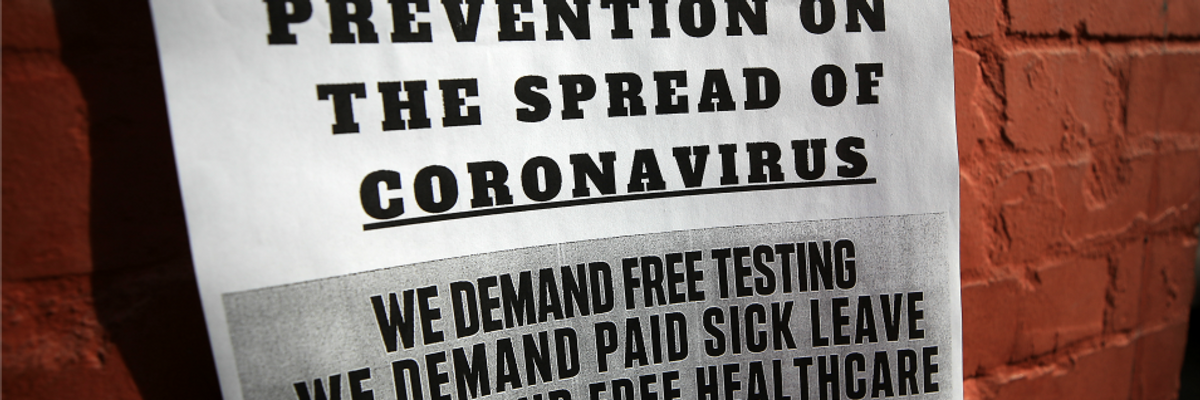In the face of the coronavirus pandemic, thank god for traditional Medicare. Millions of people like me can sleep a little better at night knowing that if our parents and grandparents get COVID-19, the disease caused by the virus, they won't hesitate to get treatment. When it comes to health insurance, older Americans with traditional Medicare and supplemental coverage are the luckiest Americans.
The 36 million people with traditional Medicare have few if any financial or procedural barriers to care, so long as they have insurance that fills gaps in coverage--Medigap, Medicaid, or retiree coverage from a former employer. They can use virtually any doctor or hospital without a referral or prior authorization, their costs are fully covered, and they have no risk of losing their coverage.
What about older adults who are enrolled in a Medicare Advantage plan, a health plan run by a corporate health insurer? Unfortunately, they have far less comprehensive coverage than people with traditional Medicare and supplemental insurance. Older adults and people with disabilities in Medicare Advantage plans face huge out-of-pocket costs if they need COVID-19 treatment or any other costly care. They could be responsible for as much as $6,700 each year for in-network care alone, depending on the plan they're in.
Seven in ten people with Medicare Advantage are in plans with high cost-sharing. They pay an average of $2,039 in out-of-pocket costs for a ten-day hospital stay, higher than the $1,408 traditional Medicare hospital deductible for people without supplemental insurance. For a 20-day hospital stay, which is likely for COVID-19 treatment, the cost for people in Medicare Advantage plans could be over $4,000.
"Virtually no one else in America has coverage as robust as that enjoyed by people in traditional Medicare with supplemental insurance."
Consequently, we can assume that a sizeable number of the 24 million people in Medicare Advantage plans will not get COVID-19 treatment because their health plans impose financial and procedural barriers to care. As we know, one in four Americans with private health insurance delay or forgo care altogether. The cost of care is a big reason. Referrals, prior authorizations, and narrow provider networks also keep people from going to the doctor.
How does traditional Medicare compare with coverage for working-age Americans? Virtually no one else in America has coverage as robust as that enjoyed by people in traditional Medicare with supplemental insurance. Individuals with employer coverage face average deductibles of $1,655 plus copayments. And, they are always at risk of losing the coverage. This week, 3.3 million working people filed for unemployment insurance. Most of them are--or soon will be--without health insurance because the cost of keeping their employer coverage is prohibitive.
This all said, traditional Medicare only ensures excellent access to care for people who have supplemental insurance. The six million people with traditional Medicare who do not have supplemental insurance also are at risk of not getting needed COVID-19 treatment. They have no procedural barriers to care--they are covered for care from most doctors and hospitals without the need for a referral or prior authorization. But, they must pay deductibles and coinsurance if they need care, with no cap on out-of-pocket costs. It's time Congress filled this coverage gap.
During this national emergency, some have proposed that the federal government mandate that corporate health plans cover the full cost of coronavirus testing and COVID-19 treatment. It sounds like a simple solution, but it's not. Years of evidence from Medicare Advantage shows that getting corporate health plans to comply with government directives is easier said than done.
Most recently, on March 10, the Centers for Medicare and Medicaid Services issued a mandate to Medicare Advantage plans to cover coronavirus treatment at out-of-network facilities at the same cost as at in-network facilities, with no referrals. To date, there's no evidence they are complying with this mandate. UnitedHealthcare, the largest Medicare Advantage plan, makes no mention of this important protection on its coronavirus web page.
There is one effective solution that would ensure that Americans not lucky enough to have traditional Medicare and supplemental insurance do not face barriers to treatment while also helping to contain the virus. The federal government could step in and pay for the full cost of their coronavirus testing and COVID-19 treatment. Because almost all doctors and hospitals participate in Medicare, the federal government has a way to pay them for the services they provide. The government would also have the data it needs to see where COVID-19 is prevalent and how best to allocate resources. In our current multi-payer system, we lack the national data that enabled Taiwan and South Korea to keep the novel coronavirus at bay and their people safe.
In the meantime, the Trump administration and Congress continue to place undue faith in corporate health insurers, a grave mistake with potentially dire consequences. The argument has always been that establishing a public health insurance system would cost too much and cause too much disruption. Really?

